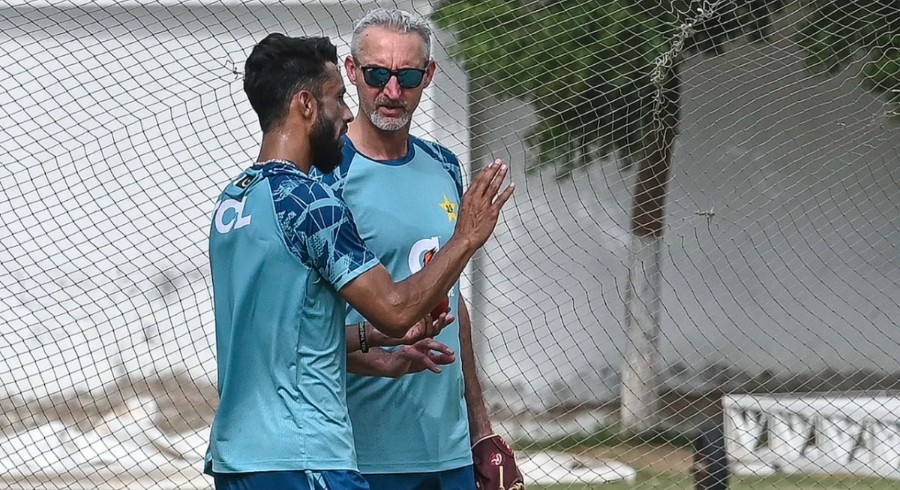Under Sarfaraz Ahmed’s captaincy, the team dominated the world, winning more than ten consecutive series
 PHOTO: AFP
PHOTO: AFP
I am the one chasing after myself,
Even I count among my own enemies.
I am not particularly fond of poetry, but some verses stick in my mind—this one being a perfect fit for Pakistan cricket. If you look closely, we are our own worst enemies. We don’t need outsiders to harm us; we do it ourselves.
Under Sarfaraz Ahmed’s captaincy, the team dominated the world, winning more than ten consecutive series. Then, the “king” of that time gave advice regarding the World Cup match against India. When Sarfaraz didn’t follow it, he landed in the “bad books.” One lost series later, he was removed. Since then, the team has struggled. There were some good moments, but the golden era never returned.
Later, top officials became displeased with Babar Azam, leading to his removal as captain. Since then, he has not been the same, struggling with form. Shaheen Afridi replaced him as captain, only to be dismissed after losing one series, with leadership handed back to Babar. When the World Cup results were again disappointing, he was removed once more.
Now, the situation has reached a point where an average player like Salman Ali Agha is leading the team. He rose to the top very quickly. When he was just a regular player, a cricket insider told me he would be the next captain—and it happened. The game of musical chairs with captaincy continues. Shadab Khan was recalled and made vice-captain.
Pakistan performed poorly in the Champions Trophy, leading to changes in the T20 squad. Everyone makes mistakes, but those who acknowledge them and learn from them improve over time. Unfortunately, that hasn’t happened here.
Ask anyone, from a roadside vendor to a company CEO, and they’ll tell you our Champions Trophy squad selection was flawed. Yet, the selectors refused to accept it. They thought they had picked the best team with one spinner and one opener. Everyone knew which players got in through favoritism, but the selection committee remained silent.
In Pakistan, an interim coach lasts longer than a permanent one—just look at how long Aaqib Javed has held his interim role. Neither selectors nor coaches were changed. The only addition was batting coach Mohammad Yousuf, who played just three T20 matches in his career. He comes from an older generation of cricketers, so what can he teach about modern cricket? Interestingly, there wasn’t much change in the ODI squad, and no one admitted to making bad decisions.
The PCB, instead of making corrections, assigned the same selectors to choose players for the New Zealand tour. And they made another mess of it. Even Pakistan’s strongest squad struggles in New Zealand’s conditions, yet they sent inexperienced youngsters.
Babar and Rizwan were criticized for slow batting, while the new captain, Salman Ali Agha, spoke about playing fearless cricket—only to forget it all on the field. Losing three wickets for one run must have made fans’ hearts race. Pakistan scored just 14 runs in the powerplay—our second-slowest ever.
Mohammad Haris’ performance was zero, yet his attitude was that of a superstar. Someone needs to tell him that fearless cricket does not mean blindly swinging at every ball. Hassan Nawaz and Abdul Samad failed on debut, but it wasn’t their fault; they were thrown into New Zealand’s tough conditions with no preparation. They need time, and one failure shouldn’t lead to their exclusion. Give them a proper chance.
Two days before the match, I warned on a TV show that Pakistan might not even reach 100 runs. Unfortunately, that’s exactly what happened. There was no player who could anchor the innings, and we couldn’t even play 20 overs. The players were paralyzed by the pressure of “fearless cricket.”
Pakistan cricket is full of conspiracies. During Mickey Arthur’s second tenure, a committee was formed to review World Cup performances, including Misbah-ul-Haq. He conducted such a “review” that he replaced Mickey as head coach and chief selector himself. The team continued to decline.
Now, history is repeating itself. Jason Gillespie, and Gary Kirsten were sidelined so that Aaqib Javed could become selector and coach. Gillespie’s case is particularly disappointing. Many players spoke highly of him. When I met him, I was very impressed by his plans. If he had stayed, Pakistan’s cricket would have improved But he fell victim to conspiracies. Now, once again, we are surrounded by the same individuals who flatter the authorities when they get a job and criticize the country’s cricket on TV after being dismissed. The things Gillespie said recently are absolutely correct. These poor foreign coaches are unaware of Pakistani politics, which is why they lag behind. Our former cricketers make big statements to win the favor of officials, but no real difference is seen on the field.
Now, God forbid, if we lose to New Zealand, we will hear statements like, “It was a young team, so the results weren’t great. These players will learn and perform better in the future.” Their paychecks will continue to be prepared every month, but the real issue is for cricket fans. After every event or series, thousands of young people are distancing themselves from the game.
It might reach a point where, even if the team plays, no one cares. The situation suggests that such a time is not far off.